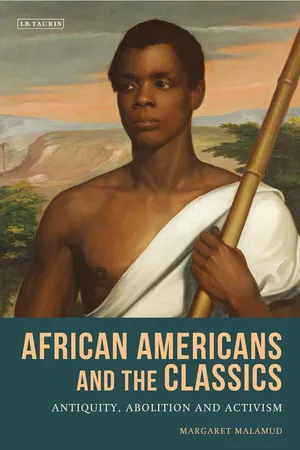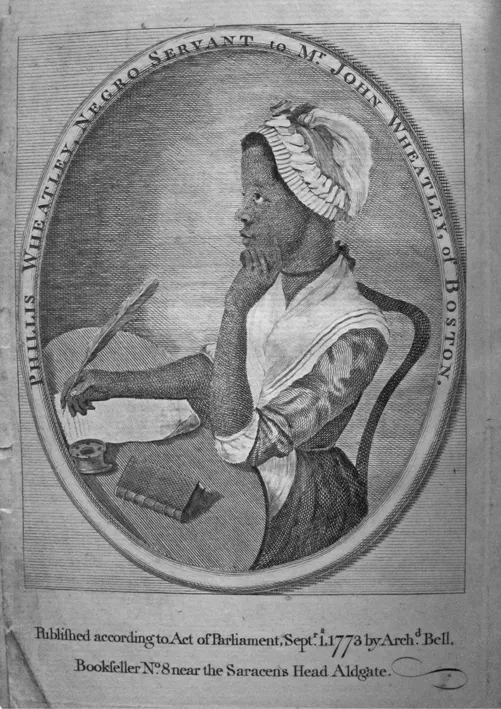![]()
1
Fighting for Classics
On 28 December 1897, the Reverend Alexander Crummell (1819–98), former missionary to Liberia and intellectual, delivered the American Negro Academy’s first annual address: ‘The Attitude of the American Mind Toward the Negro Intellect’. Long after the Civil War, Crummell, one of the co-founders of the Academy, felt the need to argue against the still prevalent ‘denial of intellectuality in the Negro; the assertion that he was not a human being, that he did not belong to the human race’, assertions which set out ‘to prove that the Negro was of a different species from the white man’. In his speech, he repeated the notorious remarks of John C. Calhoun, vice-president of the United States from 1825–28 and proslavery Senator for South Carolina from 1832 until his death in 1850, that only when he could ‘find a Negro who knew the Greek syntax’ could he be brought to ‘believe that the Negro was a human being and should be treated as a man’.1 After repeating Calhoun’s disparaging remarks, Crummell then went on to point out the incoherence of this argument in a society that denied African Americans access to classical learning and then maintained that they were incapable of it.2
Alexander Crummell, Henry Louis Gates has pointed out, accepted an underlying premise of Calhoun’s assertion: that learning Greek inducted one into the heart of Western civilization.
The salient sign of the African American person’s humanity – indeed the only sign for Calhoun – would be the mastering of the very essence of Western civilization, the very foundation of the complex fiction upon which white Western culture had been constructed, which turned out to be Greek syntax ….3
Learning Greek meant absorbing not only a linguistic resource – the Greek language – but also a cultural paradigm – the ideological and symbolic value of Greek culture. For many Americans and Europeans, Greek signified white Western culture. According to Gates, Crummell, who had attended Cambridge University, where he studied Greek as part of his studies in theology at Queens’ College (1851–53), ‘never stopped believing that mastering the master’s tongue was the sole path to civilization and to intellectual freedom and social equality for the African American person’. ‘We must not succumb as did Alexander Crummell to the tragic lure of white power’, Gates warned his readers, ‘Each of us has, in some literal or figurative manner, boarded a ship and sailed to a metaphorical Cambridge, seeking to master the master’s tools’.4 In the words of Crummell’s biographer, Wilson J. Moses, Crummell’s sermons and writings reveal ‘an inability to question the values of Victorian civilization’.5 Like many free African Americans, Alexander Crummell did indeed embrace Western civilization, and he believed it needed to be brought not only to African Americans in the United States but to Africans as well. In fact, we would be hard pressed to find many African American advocates for studying indigenous African languages and cultures in the United States when Crummell and others were struggling for education and emancipation.6 The African American embrace of contemporary Africa was largely a twentieth-century phenomenon. In the late eighteenth and nineteenth centuries, most free African Americans fought to be equal participants in the great American political experiment whose ideals, as expressed in the rhetoric of the American Revolution and the Declaration of Independence, they endorsed. African American advocates for access to a classical liberal arts education – the same education white elites received – believed such an education should lead to empowerment, and they were willing to fight for the right to obtain one.
Race, Reason and Classics
In Jamaica indeed they talk of one Negro as a man of parts and learning; but ‘tis likely he is admired for very slender accomplishment, like a parrot, who speaks a few words plainly.
David Hume, Of National Characters (1753)
As the quotation above illustrates, John C. Calhoun’s remarks on the alleged inability of African Americans to learn Classics had eighteenth-century roots in Enlightenment conversations about race and reason. Some Enlightenment thinkers questioned whether Africans (among other races) were human beings, descended along with Europeans from a common ancestor and fundamentally related to other human beings, or were they, as David Hume (1711–76) put it in 1753, another ‘species of men … naturally inferior to the whites’? According to Hume, the evidence that ‘Negroes’ were inferior to whites was that they had not produced advanced technology and were incapable of advanced ‘speculation’.7 The ‘parrot’ Hume referred to was the classically educated Jamaican poet and scholar Francis Williams (1702–70) who wrote a Latin poem, which he dedicated to George Haldane, governor of Jamaica, on his arrival on the island in 1759.8 Hume and certain other Enlightenment thinkers doubted the African’s rational capacity and ability to create ‘arts and sciences’, which in this case included the ability to learn Latin and write poetry. In 1764, Immanuel Kant (1724–1804), in his essay Observations on the Feeling of the Beautiful and the Sublime, responded directly to Hume. Kant cites Hume for the opinion that the ‘Negroes of Africa’ were incapable of creating ‘anything great in art or science’ and that they were therefore inferior to whites.9 According to such views, an African could not create imaginative literature, only mimic it, like a parrot.10
The poetry of the African American slave Phillis Wheatley (1754–84) was subjected to the same criticism and doubt as Francis Williams’. Wheatley arrived in Boston from Africa in 1761 as a young child and was bought as a household slave by the well-to-do Bostonians John and Susannah Wheatley. The Wheatleys quickly recognized her intelligence, and she was tutored in English, the Bible, and Latin (according to her master, John Wheatley, ‘She has great inclination to learn the Latin tongue’).11 She wrote her first poem in 1765, and by 1772 she had completed 28 poems. According to modern critics, Wheatley’s poetry demonstrates ‘inventive manipulation of the poetic conventions, of not just neo-classicism, but classicism as well’.12 Emily Greenwood’s analysis of several of her poems, for example, argues that Wheatley had read Latin poets in the original, particularly Horace; and John C. Shields has argued that Wheatley knew Latin well enough ‘to craft the excellent epyllion (short epic) “Niobe in Distress” from book six of Ovid’s Metamorphoses’.13 Wheatley’s ability to learn Latin and write poetry refuted common views that African Americans were incapable of learning Classics or creating art, but many in Boston doubted that she had in fact done so. Before Phillis Wheatley could publish her poems, she needed subscribers, but as Henry Louis Gates noted, ‘the necessary number of subscribers could not be found, because not enough Bostonians believed that an African slave possessed the requisite degree of reason and wit to write a poem herself’.14 She therefore endured a ‘tribunal’ of 18 men (including, among others, John Hancock and Thomas Hutchinson, governor of Massachusetts) in Boston in 1772, which interrogated her in order to judge whether she was in fact the author of her poems.15 After questioning her, they certified that she was the author, and signed the following attestation:
We whose Names are under-written, do assure the World, that the Poems specified in the following Page, were (as we verily believe) written by Phillis, a young Negro Girl, who was but a few Years since, brought an uncultivated Barbarian from Africa, and has ever since been, and now is, under the Disadvantage of serving as a Slave in a Family in this Town. She has been examined by some of the best judges, and is thought qualified to write them.16
In the verdict of her judges, the ‘uncultivated Barbarian from Africa’ had indeed learned to write poetry.
Poems on Various Subjects, Religious and Moral became the first book of poetry published by a person of African descent in the English language and was printed in London in 1773. Phillis Wheatley instantly became a celebrity on both sides of the Atlantic; in London, Countess Huntingdon hailed her as a ‘Sable Muse’.17 For some, her poetry proved the humanity of Africans, and antislavery advocates pointed to her as proof of the racial equality of African Americans. Voltaire was moved, in 1774, to write to a correspondent that Phillis Wheatley had proven that African Americans could write poetry.18 In 1788, British abolitionist Robert Boucher Nicholls praised both Wheatley and Francis Williams and tartly remarked, ‘I have never heard, that an Ourang-Outang has composed an ode. Among the defenders of slavery, we do not find one half of the literary merit of Phillis Wheatley or Francis Williams’.19 Thomas Clarkson (1760–1846), founder of the London Society for the Abolition of the Slave Trade, discussed Phillis Wheatley in his influential 1786 treatise, An Essay on the Slavery and Commerce of the Human Species, Particularly the African. Clarkson included excerpts from three of Wheatley’s poems in his Essay to prove his argument that:
if the minds of the Africans were unbroken by slavery; if they had the same expectations in life as other people, and the same opportunities of improvement, they would be equal, in all the various branches of science, to the Europeans, and … the argument that states them ‘to be an inferior link of the chain of nature, and designed for servitude,’ as far as it depends on the inferiority of their capacities, is wholly malevolent and false.20
For Clarkson, Wheatley’s poetry demonstrated clearly the racial equality of Africans. In 1773, Wheatley met with Benjamin Franklin while she was in London and she later impressed General George Washington in Cambridge, Massachusetts.
In October 1775, Phillis Wheatley sent George Washington – the newly appointed Commander-in-Chief of the Continental Army – a letter containing an ode she had composed in his honour: ‘To His Excellency George Washington’. Washington courteously responded, sending her a letter from Cambridge on 28 February 1776. Clearly, Washington was pleased with Wheatley’s poem – in his letter to her he complemented her ‘elegant Lines’ and ‘poetical Talents’ and invited ‘a person so favored by the Muses’ to visit him in Cambridge.21 In March 1776, Washington received Wheatley’s visit.
Thomas Jefferson, however, whom she did not meet, dismissed with disdain her book of poems. Jefferson famously evaluated the mental capacity of the ‘varieties in race of man’, including Indians and African Americans, in Query XIV of Notes on the State of Virginia, primarily written in 1781 and first published privately in 1784. Jefferson believed that African Americans had less capacity for rational thought than whites, that they were unable to comprehend higher mathematics, and that they lacked the imaginative capacity to produce art.22 ‘But never yet could I find that a black had uttered a thought above the level of plain narration’; Jefferson wrote, ‘never see even an elementary trait of painting or sculpture’.23 Jefferson appears to have found Wheatley’s poetry ‘dull, tasteless, and anomalous’; after reading Wheatley’s book of poems, Jefferson judged her writing as not worthy of being called poetry.24 Perhaps Jefferson’s view was a product of his status as a slaveholder – that is, he needed to justify his exploitation of African Americans by dismissing them as intellectually inferior. In any case, for David Hume, Thomas Jefferson, and John C. Calhoun (and many others), the alleged inabi...


